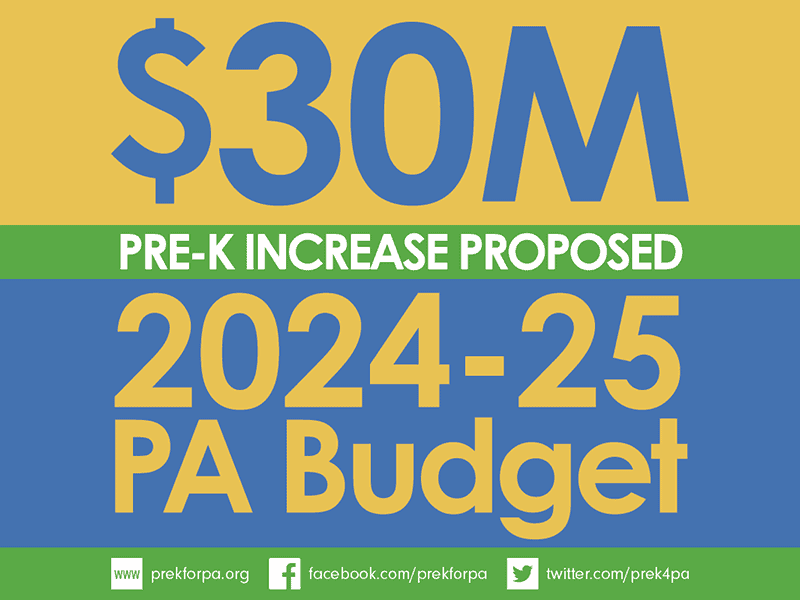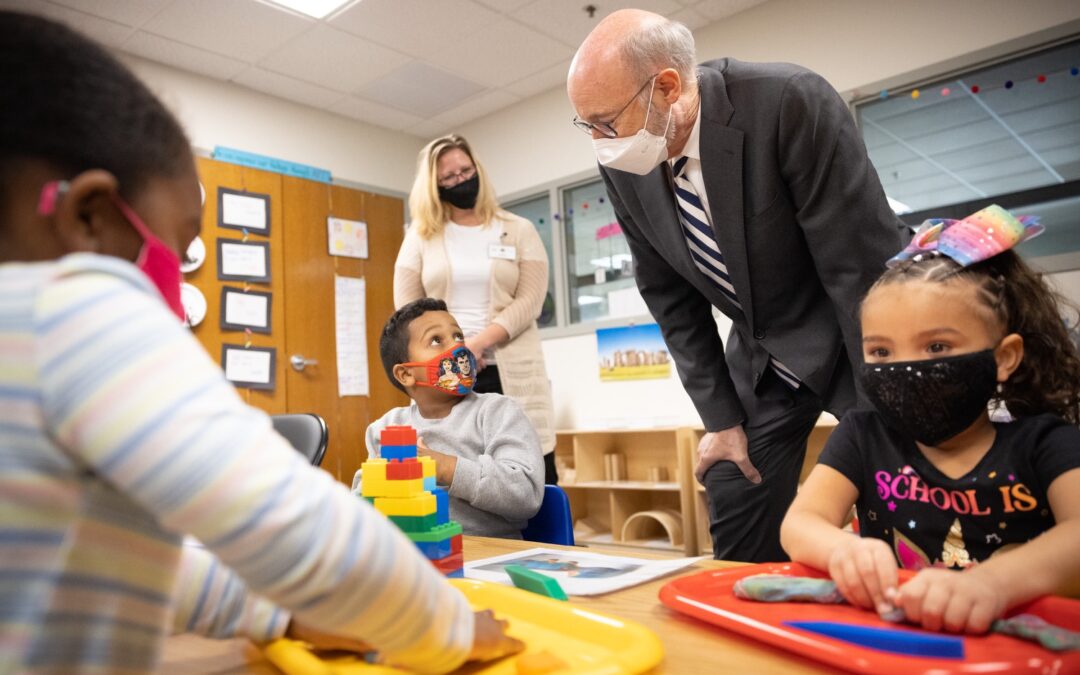
Shapiro Budget Offers Progress
Early Education Advocates Warn Historic Early Childhood Staffing Shortages will Persist
HARRISBURG, PA (February 6, 2024)–Today, the principal partners of Early Learning Pennsylvania (ELPA), a statewide coalition of advocates focused on supporting young Pennsylvanians from birth to age five, issued the following statements regarding Governor Josh Shapiro’s 2024-25 state budget proposal. ELPA operates four issue-based advocacy campaigns: Pre-K for PA, Start Strong PA, Childhood Begins at Home, and Thriving PA.
Shapiro proposal boosts pre-k rates to begin addressing teacher shortage; work remains
“Pre-K for PA applauds the Administration’s 2024-25 state budget proposal that offers progress for a system struggling with historic teacher staffing shortages exacerbated by wage growth in other sectors. For the state’s publicly-funded pre-k programs, thenearly $33 million in new state funding for Pre-K Counts ($30M) and Head Start Supplemental Assistance ($2.7M) for rate increases will provide much-needed aid to pre-kindergarten providers to combat inflationary pressures and unrelenting staffing shortages.
“Inadequate wages across the early care and education sector are causing pre-k classrooms to close throughout the commonwealth. Pre-k teachers earn roughly half of their (K-5) counterparts in public schools and face the tough choice of staying in their chosen profession as wages increase across other sectors. This investment is a critical first step in closing this gap and ensuring adequate staffing levels to operate state funded pre-k programs at current-funded capacity.
“Currently, 87,000 three-and four-year-olds in Pennsylvania are eligible but do not have access to publicly-funded pre-k programs. Additional investment will be needed in future years to further mitigate teacher shortages in this competitive economy and ensure greater access to this once-in-a-lifetime opportunity for our preschool learners.”
Budget proposal boosts rates for subsidized care; direct action needed to solve historic shortage of child care teachers
- Nearly 26,000 additional children could be served at child care programs if sites were fully staffed.
- Providers reported 2,395 open positions, resulting in the closure of 934 classrooms.
- Child care providers’ inability to recruit and retain staff is having a direct impact on the quality of their programming.
“Start Strong PA encourages Governor Shapiro and the General Assembly to tackle the child care teacher shortage head-on by establishing a program that will help providers better recruit and retain their staff. Pennsylvania’s economy depends on working families and working families depend on child care.”
Home visiting campaign concerned flat funding will lead to fewer young children, families and pregnant women being served
“Childhood Begins at Home is concerned the proposed 2024-25 budget does not account for the anticipated loss of one-time federal stimulus funds that were included in the Community-Based Family Center line (in DHS) as part of the 2023-24 final budget. Further, the proposal does not recognize the impact of federal sequestration on discretionary spending, including home visiting, due to Congressional action last year. The state rightfully included funds to offset sequestration in previous budgets, including $1million in funding in the 2020-21 final budget.
“Without any assurance that the state will sustain funding to backfill for expired stimulus funds and administrative cuts due to sequestration, we worry this ultimately will mean fewer home visiting services will be provided in Pennsylvania next year. Even more sobering is that only 7 percent of children under age 6 living in low-income households statewide currently receive voluntary, evidence-based home visiting services.
“Home visitors are supportive partners who build a trusting relationship with families and help guide them through the early stages of having and raising a child. The evidence-based models show positive outcomes, from improving health for both children and adults to achieving economic self-sufficiency to reducing child maltreatment. Childhood Begins at Home will continue to work with policymakers in the legislature and the administration to ensure Pennsylvania does not unnecessarily see a reduction in families receiving and benefiting from evidence-based home visiting services.”
Budget proposal sustains current Early Intervention program
“Early Intervention is a critical part of the Thriving PA campaign, and the governor’s proposal includes an increase of $16.7 million for Early Intervention Part C (infants and toddlers) in the Department of Human Services budget to maintain the current program and an increase of $17 million for Early Intervention Part B (age three to five) in the Department of Education budget to serve additional children. All children birth through age five with developmental delays, regardless of family income level, must be identified, referred to, and provided needed services so that they and their families reach their fullest potential.
“Thriving PA urges policymakers to build on this proposal and ensure an investment would provide for a long-needed rate adjustment for Early Intervention providers and serve additional children. Additional support would help to address key issues in the sector, including workforce shortages, achieving equitable enrollment, and addressing the growing needs of families across the Commonwealth. National data shows that not all children who are eligible to participate in Early Intervention do so.”
Governor Shapiro’s State Budget Proposal Includes:
- $32.478 million in additional funding for the state’s Pre-K Counts program.
- $2.7 million in additional funding for the Head Start Supplemental Assistance Program.
- $31.709 million in additional funding for child care ($29.331 million in Child Care Services and $2.378 million in Child Care Assistance).
- Level funding for evidence-based home visiting in the Community-Based Family Center line item and a minor reduction in the Nurse-Family Partnership line item to adjust for federal matching rates.
- $16.7 million increase for the Early Intervention Part C (infant and toddler) program through DHS.•$17 million increase for the Part B Early Intervention program (age three to five) through PDE.
About Pre-K for PA
Pre-K for PA launched in 2014 with the vision that every 3-and 4-year-old in Pennsylvania will have access to high-quality pre-k. Learn more at www.prekforpa.org.
About Start Strong PA
Start Strong PA launched in 2019 to support healthy child development, working families, and the economy by increasing access to and affordability of high-quality child care programs for young children. Learn more at www.startstrongpa.org.
About Childhood Begins
At HomeChildhood Begins AtHome is a statewide campaign launched in 2017 to help policymakers and the public understand the value of evidence-based home visiting and support public investments in the programs. Learn more at www.childhoodbeginsathome.org.
About Thriving PA
Thriving PA is a perinatal and child health campaign launched in 2021 and is working to ensure each birthing person, infant, and toddler in Pennsylvania has the opportunity for affordable, quality health care access. Learn more at www.thrivingpa.org.






